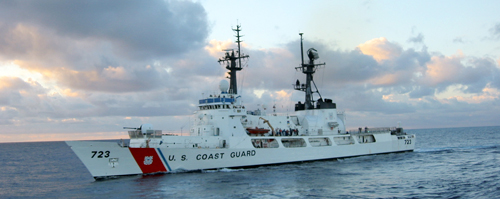
U.S. Coast Guard Cutter RUSH (WHEC-723)
It was getting on time to get out of Willow and navigate home. I have some sort of an internal meter that tells me when to go, and Boats was traveling by train to get back to his digs in Annapolis.
I held my palm over the top of my glass as Liz-s came by with a bottle of Barn Burner White. “No mas,” I said. “I don’t want to hit a bridge on the way home. We can work with the check when you get a chance.”
The disengagement process at Willow can be a slow process, and the place was still jumping. “We sold 34 beef-n-weck sandwiches so far,” she said, pursing her lips and blowing a wisp of her chestnut hair out of her eye. Tracey said she might put it on the menu as a regular item.”
“It was mighty fine,” said Ray. “But I think I need to get on the Metro and head back.”
Jim had creaked to his feet, saying he had to pack for the big trip to Vegas with his wife Mary. “Don’t do anything I wouldn’t do while I am gone,” he growled, producing his fierce bulldog-headed cane from the hooks under the bar.
“I can’t imagine what that might include,” said Jon-without, looking mildly puzzled. That is one of his most effective looks. “And I suppose I should go home and work on my PowerPoint presentation on energy and water. I have to give it to a visiting delegation from Ecuador next week.”
We waved as they exited the tall glass doors to the patio and the Amen Corner started to empty for the evening. I don’t know who shows up after we are gone, so it was mildly interesting t see the dark bar filling up with younger people.
“It is a great bar,” said Boats gesturing broadly at the dark woods and the rows of neatly organized bottles in back of Liz-S. “I am glad I came. Now, you have to come to the Fleet Reserve Club in Annapolis. That is living. You will feel right at home.”
“I would like to,” I said. “It is a wonderful town. And thanks for the run-down on the Jones Act. I had no idea how complex this was, or what the legislative authority is that governs the work-rules for the people who are working out there on America’s waterways.”
“It is my quest, now that I am out of the government again,” he said, pointing at the buff-colored volumes on the bar. “If you go to the Chapter in Blood on Brown Water titled “America’s Invisible Merchant Marine Fleet you will see the cost in human terms. Me, I have the papers to serve as an unlimited tonnage Master and First Class Pilot.”
“Could you be making a half million a year like those pilots in San Francisco Bay?”
“If Ii had more friends in Sacramento, I might. But there are some things that are more important than cash. Like I said, I have a foot in both worlds- the one of big container ships and the smaller ones. Most of the members of the “Jones Act Fleet” are less than 1,600 gross tons fully laden.”
“I don’t feel comfortable on anything smaller than 90,000 tons,” I said, polishing off the dregs in my glass. “1,600 is only half the size of a Coast Guard High Endurance Cutter, right?”
Boats nodded. “There are Jones Act vessels of much greater size, but they tend to have unions and less of the “Third World” working conditions. That is what I am trying to get Congress to wake up to. It is inhumane and dangerous to navigation.”
“I imagine crew size is the big deal,” I said, putting my wallet on the bar. “My treat, since you traveled so far. A buddy of mine was a surface warfare officer before he wised up and applied for lateral transfer to intelligence. His first ship was a Spruance-class destroyer. When they set the special sea and anchor detail to enter port they would have more than a dozen people on the bridge, including the captain, navigator, the ODD, JOOD and the pilot. There would be another large team in CIC doing radar navigation.”
“Exactly my point. Most people think of the merchant marine as a bunch of deep-draft transports, freighters, container ships and break-bulk container ships. Actually, it is completely the reverse. Most of the ships are tugs, barges and offshore service and supply vessels. That is where there might be only one guy on the bridge, and his unregulated shift might be twenty hours long without hot chow.”
“That sucks. The Navy can be pretty crazy: combat operations mean a lot of sleep deprivation. It is deadly earnest.”
“When you consider that our merchant sailors on Jones Act ships are steaming in peacetime, it ought to make people sit up and realize why there is blood on the water. The working conditions are harsh on the smaller ships, particularly for older sailors. The ships are chronically under-manned, most have crewmen aboard who are too junior to stand watches by themselves. Think of the stress of operating the ship in bad weather and at night. That doesn’t include the crappy diet and contaminated water from old tanks, second hand smoke and constant interruption of sleep.”
“Why do people do it?” I asked as Liz-S slipped the black folder with the bill in front of me. I fished in the wallet for some greenbacks and Boats pointed at it.
“People have to work, and once the brown water is in your veins you can’t get rid of it. But you should not have to die because you love your work.”
“I am on board with that. What can we do about it?”
“Write your congressmen,” said Boats. “We have to start somewhere or there will be more blood spilled in what ought to be the safest merchant marine in the world.”
“Who writes the rules?” I asked.
“The House Coast Guard and Maritime Transportation Subcommittee and the Senate Commerce, Science and Transportation Committee,” he said. “We have got to get through to them. There aren’t many of us Master Chief Boatswain’s mates left to speak out for the merchant sailors.”
I slid off the stool, waiting for the sharp stab from my knee to abate. “I will do what I can, Boats. This was fun. We ought to do it again.”
Boats smiled. “Yeah, it was. Great food. It was interesting to see all these characters I read about every day and realize they are real flesh and blood.”
“It is sort of a reality show,” I said, planting my weight on the cane. “The good kind, with excellent wine.” I waved goodnight to Jasper and Liz-S. “See you Monday, guys!” I called.
Boats leaned forward: “A last word about what is at stake. Not only are American Merchant Seamen dying and bridges being hit dropping civilians into the water but the entire Coast Guard marine safety mission is at risk. I’m the last office holder in the maritime labor movement who thinks that the Coast Guard marine safety mission is worth saving. I don’t believe that the USCG does this mission very well, but I’ve seen first hand how the effort goes hand-in-hand with the port and waterways security mission.”
“I will write my congressman and Senators,” I said. “The transportation bill is still being debated isn’t it?”
Boats looked grim. “If I fail at getting the Congress to act on the NMA’s Second request to Congress before I accept a different job or just actually retire in fact, there will be a full court press by labor to toss the Coast Guard out of the Marine safety business.”
“That is the sort of deregulation that could be a catastrophe,” I said, hobbling toward the door. Boats tugged it open and we walked out onto the steps leading down to the patio.
“The Coast Guard has treated the limited tonnage Jones Act seamen like dirt, and they’ re mad as hell and not going to take it anymore. Now that you know the work rules are killing merchant sailors, we ought to talk about port security, and some things the bad guys have been thinking about doing to us.”
“You are a man on a mission, Boats.”
“You better believe it. Don’t piss off the Master Chief.”
“Roger that,” I said, and he walked briskly off toward the Metro, and I hobbled toward the Bluesmobile and into the night.

Copyright 2012 Vic Socotra
www.vicsocotra.com
